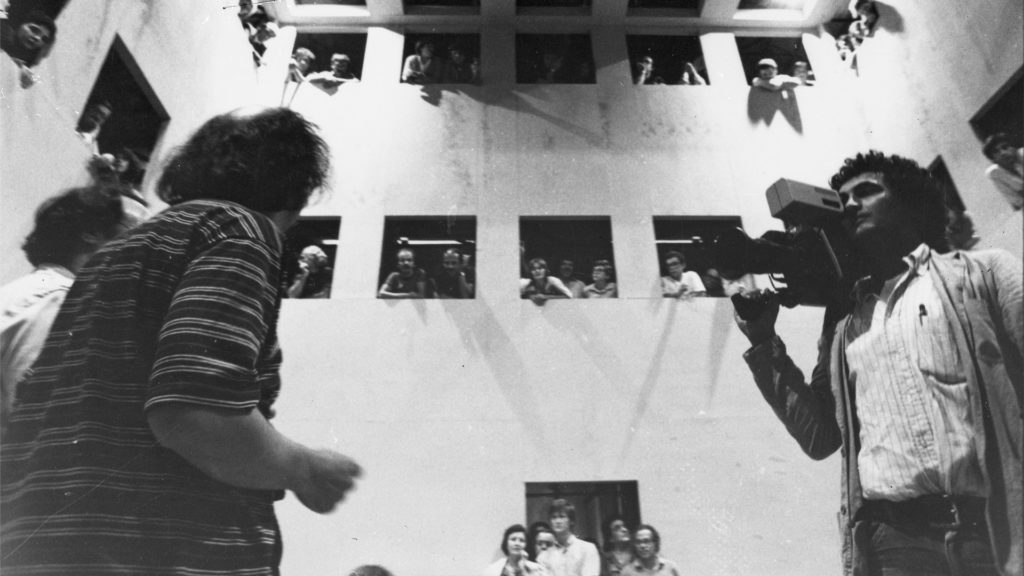event
Tuesday 27 June 2017 7.30 PM - 9.00 PM
Estate Romana 40 years on
other events of the Estate al MAXXI 2017 cycle

– for young people aged between 18 and 25 (not yet turned 25);
– for groups of 15 people or more;
– La Galleria Nazionale, Museo Ebraico di Roma ticket holders;
– upon presentation of ID card or badge: Accademia Costume & Moda, Accademia Fotografica, Biblioteche di Roma, Centro Sperimentale di Cinematografia, Enel (for badge holder and accompanying person), FAI Fondo Ambiente Italiano, Feltrinelli, Gruppo FS, IN/ARCH Istituto Nazionale di Architettura, Sapienza Università di Roma, LAZIOcrea, Palazzo delle Esposizioni, Amici di Palazzo Strozzi, Accademia Nazionale di Santa Cecilia, Scuola Internazionale di Comics, Teatro Olimpico, Teatro dell’Opera di Roma, Teatro di Roma, Università degli Studi di Roma Tor Vergata, Youthcard;
– upon presenting at the ticket office a Trenitalia ticket to Rome purchased between 27 November 2024 and 21 April 2025
valid for one year from the date of purchase
– minors under 18 years of age;
– myMAXXI cardholders;
– on your birthday presenting an identity document;
– upon presentation of EU Disability Card holders and or accompanying letter from hosting association/institution for: people with disabilities and accompanying person, people on the autistic spectrum and accompanying person, deaf people, people with cognitive disabilities and complex communication needs and their caregivers, people with serious illnesses and their caregivers, guests of first aid and anti-violence centres and accompanying operators, residents of therapeutic communities and accompanying operators;
– MiC employees;
– journalists who can prove their business activity;
– European Union tour guides and tour guides, licensed (ref. Circular n.20/2016 DG-Museums);
– 1 teacher for every 10 students;
– AMACI members;
– CIMAM International Committee for Museums and Collections of Modern Art members;
– ICOM members;
– from Tuesday to Friday (excluding holidays) European Union students and university researchers in art history and architecture, public fine arts academies (AFAM registered) students and Temple University Rome Campus students;
– IED Istituto Europeo di Design professors, NABA Nuova Accademia di Belle Arti professors, RUFA Rome University of Fine Arts professors;
– upon presentation of ID card or badge: Collezione Peggy Guggenheim a Venezia, Castello di Rivoli Museo d’Arte Contemporanea, Sotheby’s Preferred, MEP – Maison Européenne de la Photographie;
for groups of 12 people in the same tour; myMAXXI membership card-holders; registered journalists with valid ID
under 14 years of age
disabled people + possible accompanying person; minors under 3 years of age (ticket not required)
MAXXI’s Collection of Art and Architecture represents the founding element of the museum and defines its identity. Since October 2015, it has been on display with different arrangements of works.


30 Apr 2025 07.30 pm
music performanceOkkyung Lee & Rashad Becker
6 May 2025 06.00 pm
books at MAXXINero indelebileby Mirella Serri
7 May 2025 06.00 pm
talkItalia Amore Mioby Gianfranco Jannuzzo
11 May 2025 12.00 pm
guided toursStop DrawingArchitecture beyond Representation
14 May 2025 06.00 pm
books at MAXXIPaleoestetica. Alle origini della cultura visualeby Michele Cometa
MAXXI Piazza – admittance free
40 years after the first Basilica of Maxentius event
MAXXI reprising the Estate Romana
An opportunity for debate with some of the protagonists and followers of that season, commemorating how at the beginning of that summer in 1977, the urban landscape of Rome changed suddenly, transforming by some strange enchantment into a sequence of places in which film, poetry, art and music set the scene for a collective public and participatory “street” experience.
Since then and for many years that followed, the Estate Romana has nourished the idea of ephemeral architecture as a means of transforming the city
Nicolini’s project mobilized the finest creative youth of the time and soon managed to change perception of urban public space through non-permanent architecture and through the public nature of the arts.
Speakers
Alberto Abruzzese sociologist and writer
Achille Bonito Oliva art critic and curator
Cecilia Canziani art critic and curator
Andrea Cortellessa literary critic and architectural historian
Daniela Lancioni art critic and curator
Marilù Prati coordinator of the activities valorizing the Nicolini archive
Franco Purini architect
Introduced and moderated by
Pippo Ciorra Senior Curator, MAXXI Architettura